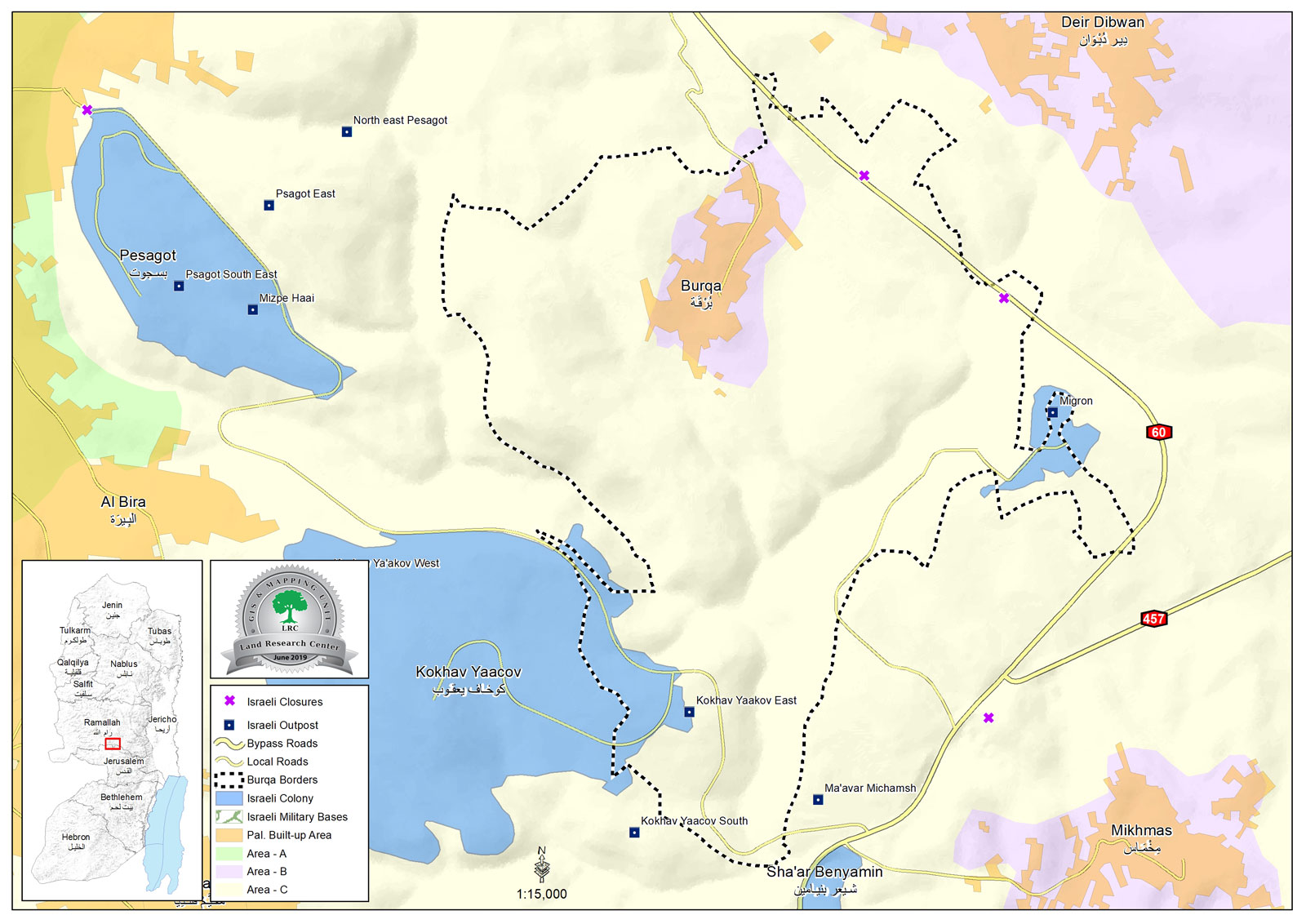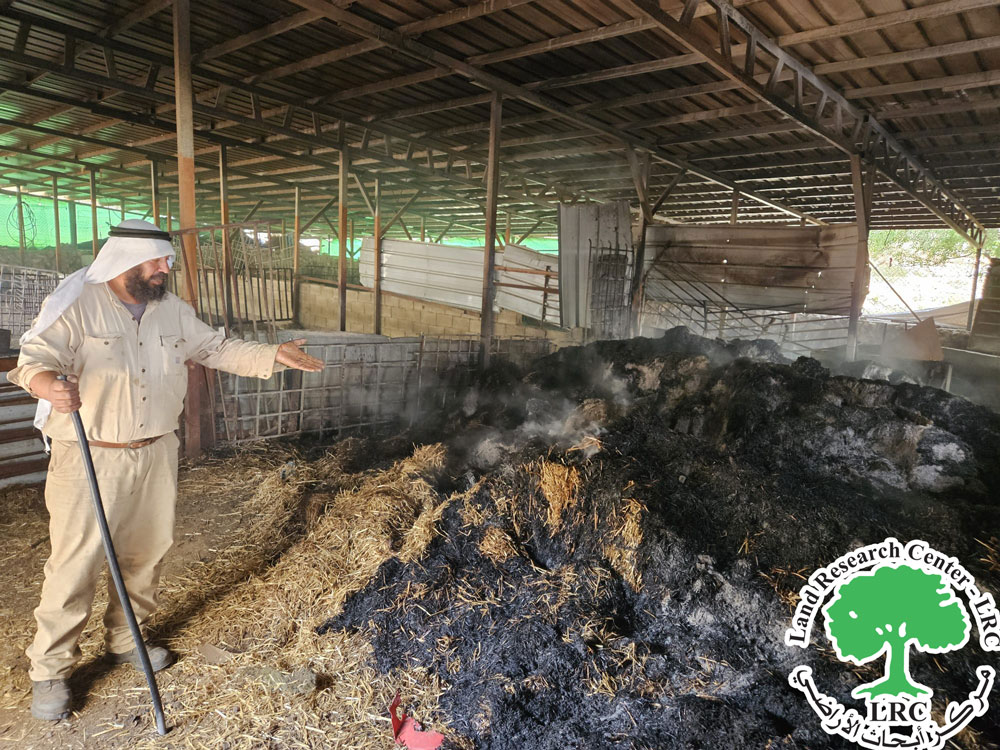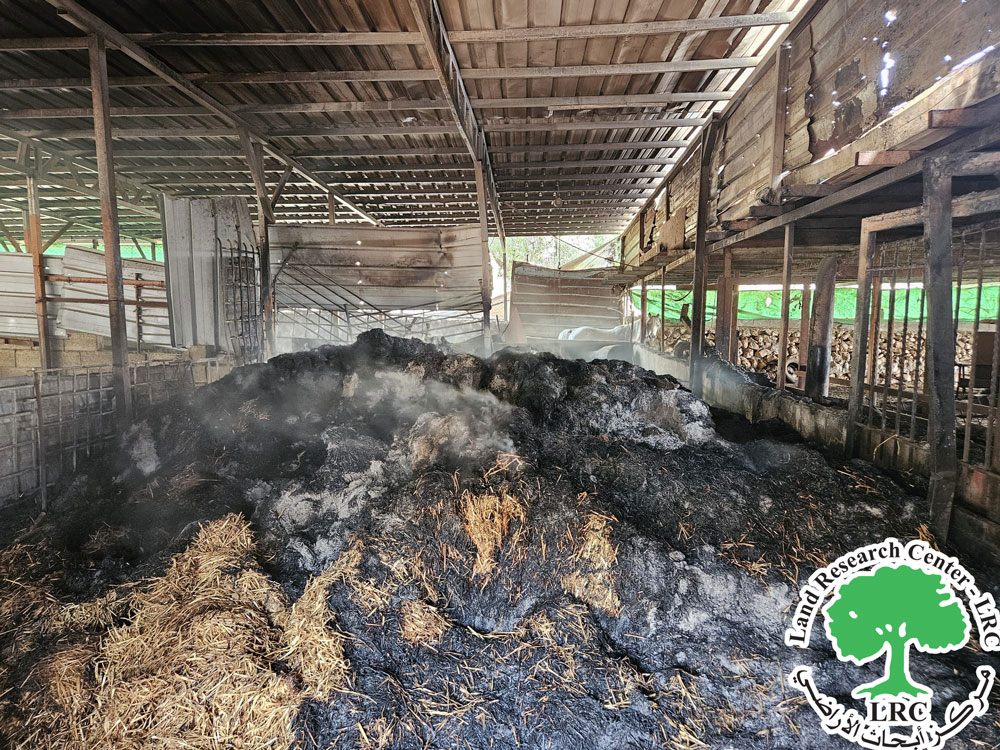Settlers Set Fire to a Livestock Farm in Burqa Village/ Ramallah Governorate
Violation: Arson of a livestock farm.
Date of Violation: April 25, 2024.
Location: Burqa Village / Ramallah Governorate.
Perpetrators: Settlers.
Affected Party: Farmer Nitham Ali Abdullah Matan.
Description:
In the early hours of Thursday (April 25, 2024), a group of settlers stormed Burqa village, located north of Ramallah city. They attacked a livestock farm owned by farmer Nitham Ali Abdullah Matan, the sole provider for a family of (6), including (2) females.
According to on-site investigations and the testimony of the affected farmer:
The settlers infiltrated a plot of land located north of the village, specifically in the "Al-Mintar" area, taking advantage of the area's quiet. They set fire to a barn used for raising sheep, owned by the affected farmer. The fire resulted in the burning of hay bales stored inside the barn, as well as damage to the barn structure, which covers an area of 90 m². The structure is built on a concrete base, with iron frame corners and a tin roof, and is used to house 45 sheep.
The impacted farmer stated:
"I was shocked on Thursday morning when I received a phone call from a fellow farmer living near my farm. He informed me of a fire inside the farm. I immediately rushed to the farm with two of my sons. Upon arrival, I saw the flames engulfing the hay bales, which were completely burned. The fire had also caused significant damage to parts of the barn. I quickly extinguished the flames by spraying water and isolating the burned hay bales. The farm suffered extensive and visible damage overall.
The farm is located no more than 400 meters from the settler outpost stationed on the outskirts of the village's lands, which was the source of the damage and the fire that destroyed my farm."
Burqa Village [1]:
Burqa village is located 10 km east of Ramallah city. It is bordered by Beitin to the north, Al-Bireh and Kafr Aqab (near the settlements of Pasgot and Kokhaf Jacoup) to the west, Deir Dibwan to the east, and Mikhmas to the south.
As of (2017), the village has a population of (2,047) people.
The village covers a total area of 6,065 dunums, of which (264) dunums are designated as the built-up area of the village.
On its lands are the “Migron” outpost and “the Kokhaf jacoup” settlement, established in 1984. The settlement has seized (284) dunums of Burqa’s lands and is home to over (3,819) settlers.
Additionally, the bypass road No. 60 has taken over 160 dunums of the village’s lands.
According to the Oslo Accords, the land in the village is classified as follows:
- Area B: 504 dunums.
- Area C: 5,561 dunums.
Legal Commentary
The Palestinian environment in general faces numerous violations by the Israeli occupation which flagrantly disregards all international and national laws and norms related to environmental rights The right to live in a clean and healthy environment is an inherent human right since creation
The occupation often attempts to present itself as a guardian of international environmental issues despite having signed major environmental protection agreements such as :The Basel Convention 1989 , The Rotterdam Convention 2008, The Stockholm Convention 2001, The Ramsar Convention 1971
in addition to various air quality and climate protocols
Nevertheless Israel consistently violates these treaties without accountability or oversight.
In addition to the texts related to the right to enjoy a clean and healthy environment for all those under military occupation according to international laws, conventions, and treaties, such as the International Covenant on Economic, Social, and Cultural Rights under United Nations General Assembly Resolution 2200A (d-21) dated December 16, 1966, in Article (1), paragraph (2):
"...All peoples have the right to freely dispose of their natural wealth and resources without prejudice to any obligations arising from the requirements of international economic cooperation based on the principle of mutual benefit and international law. In no case may a people be deprived of its means of subsistence..."
It is clear that the violations carried out by the Israeli side contradict the laws of the "occupying power" before any other laws. Referring to the details of this case, the Israeli Penal Code of 1977 and its amendments state that trespassing on someone else's property to commit a crime punishable by law is an offense. Article 447 states:
"Anyone who does any of the following with the intent to intimidate, insult, or harass the property owner or to commit a crime shall be punished with imprisonment for two years:"
- Entering or crossing the property;
- After entering the property legally, staying there illegally.
(B) A crime is committed under this section when the offender carries a firearm or a cold weapon, and the penalty is imprisonment for four years."
By reading the text of this article, we find that the Israeli Penal Code criminalizes the mere act of entering someone else's property without permission with the intent to insult, harass, or intimidate, and punishes this act with two years in prison. The penalty is doubled when the offender enters the property and commits a crime using a weapon or sharp tool, or even any other form of attack, such as setting fire to the property—such as a livestock farm. This is explicitly criminalized in the aforementioned article of the Israeli Penal Code.
Therefore, the Israeli perpetrator, by setting fire to the hay bales and the barn structure, caused environmental pollution in the area due to the emission of toxic smoke. This action violates, without any legitimate justification, both international laws and treaties, as well as the internal laws of the "occupying state," constituting a clear violation. Consequently, the "Israeli judiciary" must hold the settlers accountable and punish them for these actions according to the provisions of their laws. However, there is no legal accountability for the perpetrator by the Israeli judiciary. Nonetheless, this does not negate the right of any person on this land to live in a clean, safe, and protected environment free from any violations and attacks.
[1] Source: GIS – LRC.
مشروع: حماية الحقوق البيئية الفلسطينية في مناطق "ج" SPERAC IV - FCDO
Disclaimer: The views and opinions expressed in this report are those of Land Research Center and do not necessarily reflect the views or positions of the project donor; the Norwegian Refugee Council.
إخلاء المسؤولية: الآراء ووجهات النظر الواردة في هذا التقرير هي آراء ووجهات نظر مركز أبحاث الأراضي ولا تعكس بالضرورة وجهات نظر أو مواقف الجهة المانحة للمشروع؛ المجلس النرويجي. للاجئين



